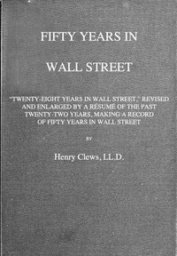

Fifty Years in Wall Street (1908)
by Henry Clews


One principle of the unions is exceedingly unjust to the workingmen to the last degree. It starts with the assumption that all workmen are equal in their capacity as to the quality of service or work and the quantity of production; and upon this false assumption is based the injustice of compelling all members to bind themselves to a uniform rate of pay. A greater injustice and a more flagrant inequity cannot be found in the whole range of the world's social institutions; nor is the wrong the less culpable because the members voluntarily inflict it upon themselves; for as "no man liveth unto himself" but has dependents for whom he is bound to do the best in his power, so no man is free to throw away to the less industrious or less competent what his superior abilities and industry have earned for himself.🏁
Global Leaderboard
| # | Player | Time | Duration | Accuracy | WPM | pp | |
|---|---|---|---|---|---|---|---|
| 1 | |||||||
| 2 | |||||||
| 3 | |||||||
| 4 | |||||||
| 5 | |||||||
| 6 | |||||||
| 7 | |||||||
| 8 | |||||||
| 9 | |||||||
| 10 |


One principle of the unions is exceedingly unjust to the workingmen to the last degree. It starts with the assumption that all workmen are equal in their capacity as to the quality of service or work and the quantity of production; and upon this false assumption is based the injustice of compelling all members to bind themselves to a uniform rate of pay. A greater injustice and a more flagrant inequity cannot be found in the whole range of the world's social institutions; nor is the wrong the less culpable because the members voluntarily inflict it upon themselves; for as "no man liveth unto himself" but has dependents for whom he is bound to do the best in his power, so no man is free to throw away to the less industrious or less competent what his superior abilities and industry have earned for himself.🏁